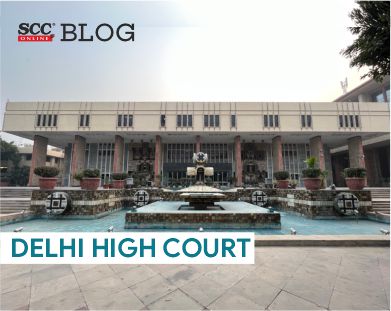Delhi High Court: In a petition filed by female detainee (‘Petitioner’) seeking a declaration that the conduct of the ‘Virginity test’ on the Petitioner by the CBI (‘Respondent’) is unconstitutional and against the tenets of Fundamental Rights. The petition further seeks to punish the errant officials of the CBI who have subjected the petitioner to undergo Virginity test’ against her own free will and for leaking the conduct and result of the test to the media, also seeks to direct the respondents to pay exemplary compensation to the petitioner for the mental agony/torture/ humiliation undergone by the petitioner for having subjected her to undergo Virginity test’. Swarana Kanta Sharma, J., held that the virginity test conducted on a female detainee/ accused under investigation, or in custody, whether judicial or police, is unconstitutional and in violation of Article 21 of the Constitution which includes the right to dignity and passed directions sensitizing the police officials in this regard.
Central Bureau of Investigation (CBI) arrayed the petitioner as one of the accused in the murder of one of the inmates of a Hostel in Kottayam, Kerala. The petitioner was thereby arrested and remanded to the custody of the Central Bureau of Investigation for further investigation. The case of petitioner is that she was forcefully subjected to undergo ‘Virginity Test’ by the CBI against her consent. The said virginity test was conducted by the investigating agency under the pretext of an investigation to substantiate their case in relation to the death of a deceased, who was found dead in a well on 27-03-1992.
The result of the said test was allegedly leaked to the media by the CBI and it is the case of the petitioner that the conduct of the CBI in subjecting the petitioner to a virginity test forcefully against her free will and selective leakage of the test by the investigating agency to the electronic and print media even before submitting the result before the concerned Court amounts to a violation of petitioner’s fundamental rights.
The Court noted that the present writ petition was filed in the year 2009, and during the pendency of this writ petition, several judgments of the Supreme Court and other High Courts were passed wherein the constitutional validity of the “virginity”, or the “two-finger” test has been adjudicated upon and the test has been declared unconstitutional.
On the question before the Court, whether the “Virginity Test” is covered under Section 53 of Code of Criminal Procedure Code (CrPC), the Court stated that bare perusal of Sections 53 and 54 CrPC alongwith Selvi v. State of Karnataka, (2010) 7 SCC 263 it is clear that virginity test finds no mention in the ‘explanation’ to Section 53 as a technique to be used in the medical examination of an accused person to ascertain the facts which may afford evidence.
Further, the Indian Parliament, while introducing the ‘explanation’ to Section 53 CrPC by the Code of Criminal Procedure (Amendment) Act, 2005, and listing several forms of medical examination, left the scope for more techniques to be included within its ambit by the concept of “ejusdem generis”. Thus, by no stretch of examination, ‘virginity test’ can presumably fall under the said provision.
The Court said that the virginity test is neither modern nor scientific, rather archaic and irrational. Modern science and medical law disapprove the conduct of such tests on women.
The Court dealt with the main issue under consideration, whether the test of virginity will also be unconstitutional in case such a test is conducted on a female accused during investigation of a crime by stating that the “right to dignity” of a person as available under Article 21 of Constitution of India is not suspended even when the person is accused of committing an offence or is arrested. The right to life and personal liberty under Article 21 can be suspended only as per procedure established by law, and such procedure must be just, fair and reasonable and not arbitrary, fanciful and oppressive.
The Court remarked that the right to personal liberty of an accused gets suspended the moment one is arrested as the same might be necessary for State security. However, the right to dignity is not suspended or waived even of an accused, undertrial or convict. This test is sexist and is in violation of the human right to dignity even of a female accused if she is subjected to such a test while being in custody.
Thus, the Court passed the following directions
(i) It is declared that the virginity test conducted on a female detainee, accused under investigation, or in custody, whether judicial or police, is unconstitutional and in violation of Article 21 of the Constitution which includes right to dignity
(ii) The necessary information regarding unconstitutionality of virginity test as above be circulated to all investigating agencies/stakeholders through Secretary, Union Ministry of Home Affairs, Secretary, Union Ministry of Health and Family Welfare and Secretary, Department of Health and Family Welfare, Govt. of NCT of Delhi.
(iii) The Delhi Judicial Academy is directed to include in its curriculum and in the workshops conducted for investigating officers, prosecutors and other stakeholders, the information regarding this issue.
(iv) Similarly, the Delhi Police Academy for Training shall also include the necessary information regarding this issue in its training curriculum.
(v) The Commissioner of Police, Delhi is also directed to ensure that the investigating officers are informed and sensitized in this regard.
[Sr. Sephy v. CBI, 2023 SCC OnLine Del 717, decided on 07-02-2023]
Advocates who appeared in this case:
Mr. Romy Chacko, Mr. Varun Mudgal and Mr. Sudesh Kumar, Advocates for the Petitioner;
Mr. Ripu Daman Bhardwaj, SPP for CBI with Mr. Kushagra Kumar, Advocate;
Mr. Kirtiman Singh, CGSC with Mr. Waize Ali Nook, Mr. Madhav Bajaj and Ms. Kunjala Bhardwaj, Advocates for UOI;
Mr. S. Nanda Kumar, Ms. Deepika Nanda Kumar and Mr. Anand Murthi Rao, Advocates for R-4 (NHRC).
*Arunima Bose, Editorial Assistant has reported this brief.







